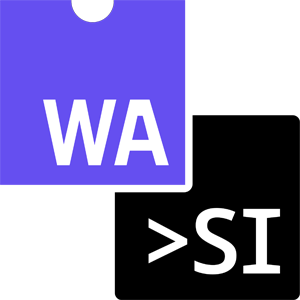
C++, Rust & WASI
Compile a Rust project with C++ bindings to WASI
Web assembly has gotten more and more popular, with more browser supporting it. But it has some serious limitations, that are mostly due to the execution target which is the browser. For security reasons, web assembly cannot execute system calls such as reading / writing files, creating threads…
In order to solve this, WASI (standing for Web assembly system interface) was created. It was designed as an extension of web assembly with the same goal in mind but supporting some system functionnality. As of today, WASI support reading / writing files, creating threads through extension, sockets through another extensions… It is still in its early development and you will only find preview available for now.
But you can already see some implementation of it in interseting ways. Thanks to WASI, VScode support native extension (Rust & C++) on vscode.dev ! You can find more about this here.
Build c++ API into rust
The most common way to make a C++ library accessible to rust is by creatings bindings for foreign C++ code, which we call FFI (Foreign function interface). You can find more about it on the rustonomicon.
To build an application using FFI, it is common to have the following code architecture (following some conventions):
- a crate
my-app-sysholding a generated interface to your code, that is built using a build.rs and linked to the crate. - a crate
my-appusing my-app-sys and eventually proposing an improved interface with a more rust-like interface, hiding the unsafe call being a nice interface.
You should have a codebase following this structure:
my-app
├─ README.md
├─ Cargo.toml
├─ my-app-sys
│ ├─ Cargo.toml
│ ├─ build.rs # The build script
│ ├─ src
│ │ └─ lib.rs # Here are the rust bindings to the C++ library.
│ └─ native # Your library C++ code is here
│ ├─ header.h
│ ├─ impl.cpp
│ │ ...
└─ my-app
├─ Cargo.toml
└─ src
└─ main.rs
NOTE: You can look at bindgen to automate the binding generation.
Build c++ API into rust WASI
Building C++ to WASI
In order to build C++ to WASI, you need to use the WASI SDK that you can download in the release section of their Github repo. This SDK contains some required component such as a sysroot containing libc, libc++ & some important library already compiled for WASI to be linked against on build.
To build a program, you will need to use clang++ as its the only supported compiler for now. Either use any clang version to which you provide a path to WASI SDK sysroot, or use the bundled clang version in WASI SDK that already link the sysroot internally to build your application.
You will need to set some important flags such as:
-fno-exceptionsas WASI does not support exceptions yet.-L/path/to/sysroot/{wasi-target}/lib/wasm32-wasito tell the compiler where to find c++ lib to link against-lstatic=c++ -lstatic=c++abto tell the compiler which C++ lib we link against.--sysroot="path/to/sysrootto tell the compiler where to find all configurations for target, which you can find in WASI SDK.
You should be able to build your project and generate a .wasm file.
Building rust to WASI
Building WASI is quite straight forward in rust. First simply add one of the target you need. WASI has multiple target as its still in its early prototyping. You will have access to 2 previews version as of now aswell as some extension that support interesting features such as threads. Theses extensions are not yet part of core, but they are already quite used:
- wasm32-wasip1: Preview 1
- wasm32-wasip2: Preview 2
- wasm32-wasip1-threads: Preview 1 with threads support
You can then simply add the target. If you don’t add it, you will not be able to compile if you use anything from standard library and you will get error not found on std & core library at compilation such as in the following image :

To fix this, just run the following command:
rustup target add wasm32-wasip1
You will also need the WASI_SYSROOT environment variable set for cc-rs targetting the sysroot from WASI_SDK. cc-rs will look for it and setup everything.
Then simply run:
cargo build --target wasm32-wasip1
… which will generate a wasm executable. To test it directly, you can download wasmtime and run wasmtime /path/to/my/wasm.
If it does not, check the log, and ensure that you have clang accessible in path

& sysroot aswell, in order to find c++ std lib header.

Linking C++ to rust for WASI
Now the most intersting, we know how to compile rust to WASI & C++ to WASI, aswell as how to bind C++ API to rust but using C++ binding to rust in WASI can be simplified.
For ease, you can use cc-rs which support compilation to WASI out of the box.
You can then simply build the library with the following build.rs:
fn main() {
// Use the `cc` crate to build a C file and statically link it.
// It now support WASI c++ out of the box (since version 1.0.104)
// It relies on WASI SDK & clang which is the only supported compiler as of today.
let mut builder = cc::Build::new();
builder
.std("c++17")
.cpp(true)
.include("native")
.flag("-v")
.file("./native/cool.cpp");
builder.compile("cool");
}
Your application should now be running C++ code within a WASI executable in rust. This is a really cool features as this let us run some big project on the web ! For example, you can build glslang to WASI using this ! A full features version of glslang running in a browser supporting WASI, now imagine the possibilites… I have used it for a VS code extension of mine for shader linting & completion, shader validator which I will talk about some another time !
You can find a complete codebase on my git repo for compiling C++ to WASI with rust.